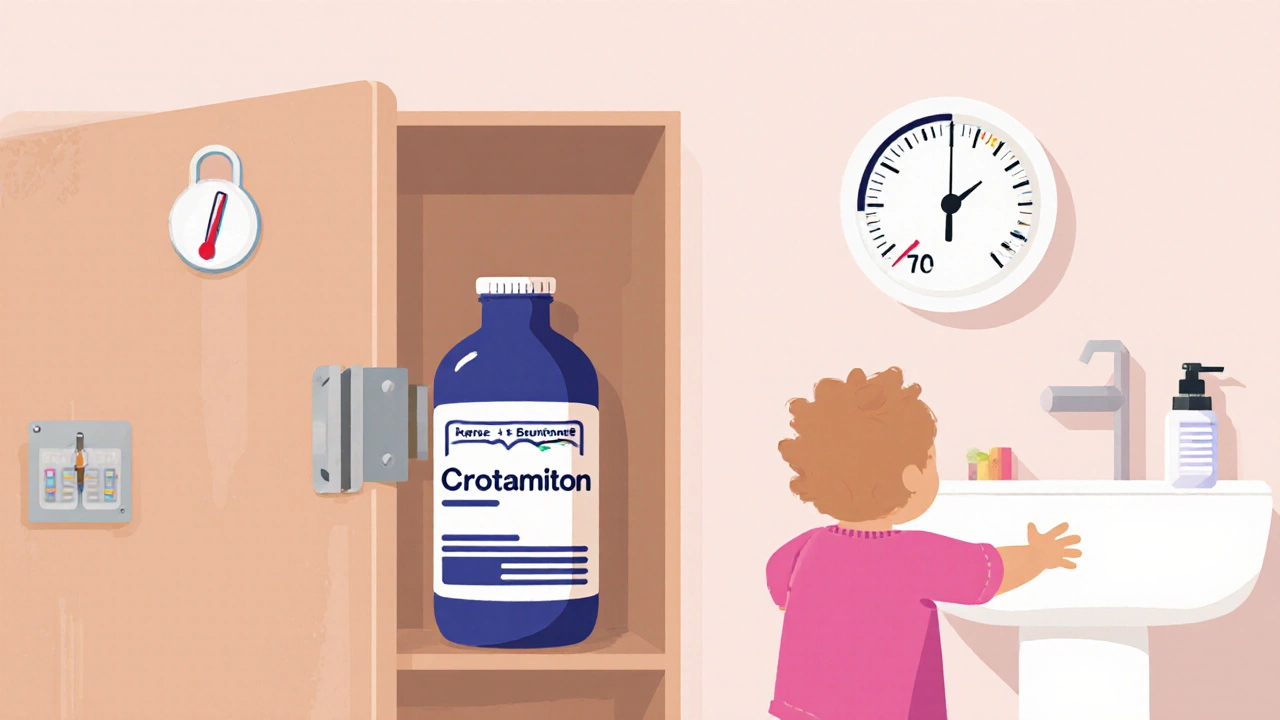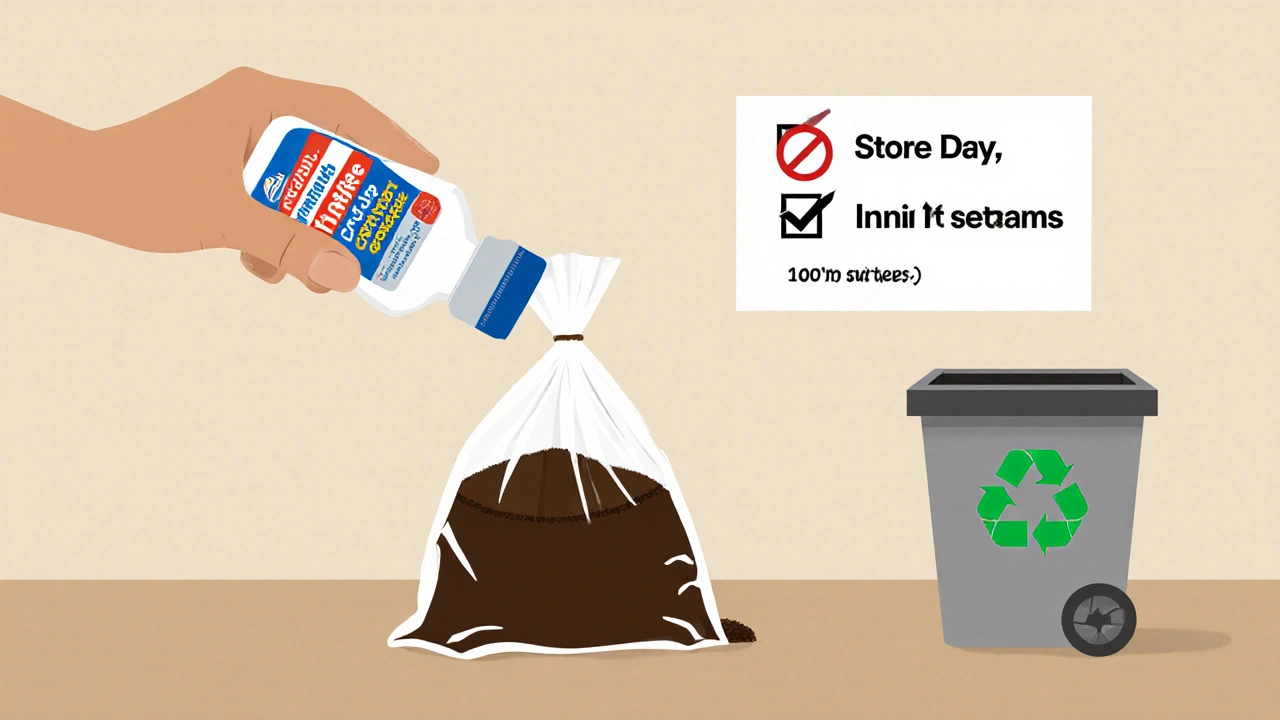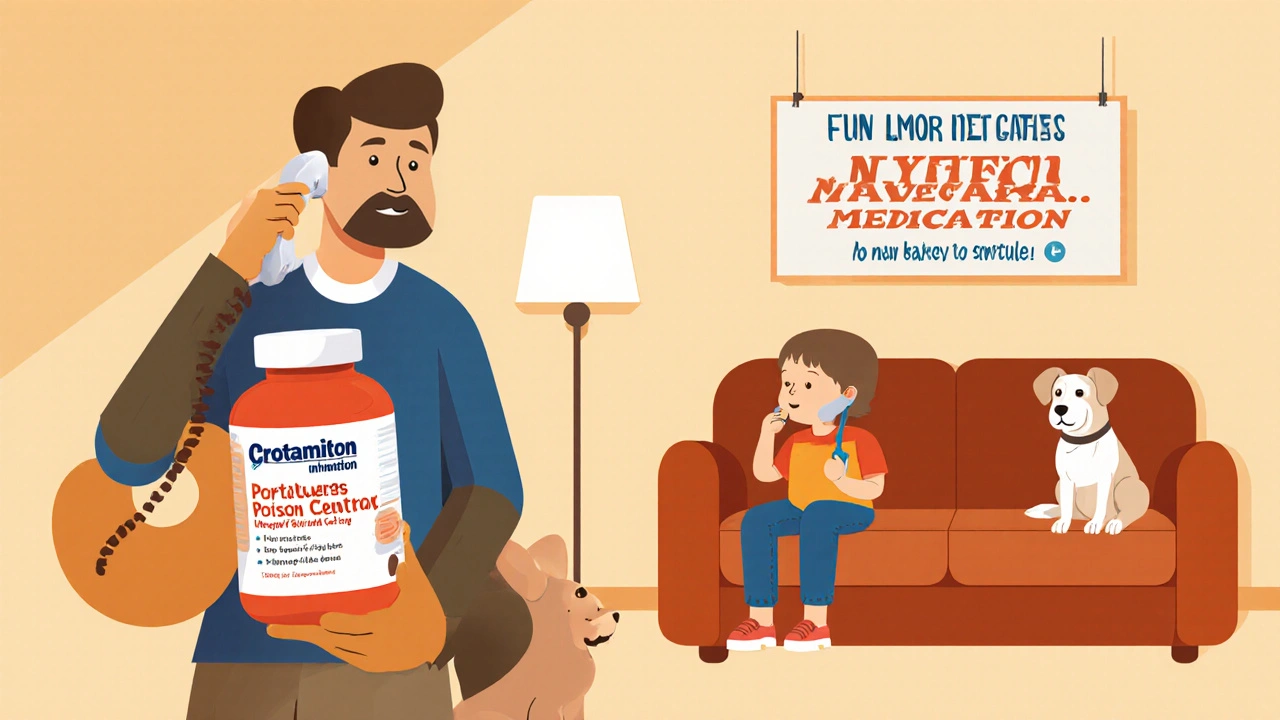How to Store and Dispose of Crotamiton Safely
 Nov, 3 2025
Nov, 3 2025
Storing and disposing of crotamiton isn’t something most people think about until they have a leftover bottle sitting in the medicine cabinet. But getting this wrong can be dangerous - for you, your kids, or even the environment. Crotamiton is a topical medication used to treat scabies and itching, and while it’s not a strong drug like antibiotics or opioids, it still needs careful handling. This isn’t just about following labels. It’s about preventing accidental exposure, contamination, and misuse.
What Is Crotamiton and Why Does Storage Matter?
Crotamiton is a topical lotion or cream applied to the skin to kill scabies mites and reduce the intense itching they cause. It’s usually prescribed for adults and children over 3 years old. The active ingredient works by disrupting the mites’ nervous systems, but it’s not harmless to humans either. If swallowed, inhaled, or absorbed in large amounts through broken skin, it can cause nausea, dizziness, or even nerve irritation.
That’s why storage matters. You don’t want a child mistaking it for lotion. You don’t want it sitting near food or in a bathroom where humidity can break it down. And you definitely don’t want someone else using your prescription - even if they have itching too.
How to Store Crotamiton Properly
Follow these three simple rules to keep crotamiton safe and effective:
- Keep it at room temperature - between 68°F and 77°F (20°C to 25°C). Don’t leave it in the car on a hot day or near a radiator. Heat can make the lotion separate or lose potency.
- Store it away from moisture - the bathroom isn’t the best spot. Humidity can cause the formula to degrade faster. A bedroom drawer or kitchen cabinet away from the sink is better.
- Keep it out of reach of children and pets - use a locked cabinet if possible. Crotamiton containers often look like regular lotion bottles. A curious toddler might squeeze it on their skin or even try to drink it.
Always keep the original container with the label attached. The label tells you the strength, expiration date, and what it’s for. If you transfer it to another bottle, you risk mixing it up with other meds or losing critical info.
What Happens If Crotamiton Expires?
Medications don’t suddenly turn toxic after their expiration date, but they do lose effectiveness. Crotamiton’s active ingredients break down over time, especially if stored poorly. If it’s been sitting for over a year past the expiration date, it might not kill scabies mites at all.
Signs your crotamiton has gone bad:
- Changed color - turned yellow, cloudy, or separated
- Odd smell - smells sour, rancid, or chemical instead of mild
- Texture change - too thick, watery, or lumpy
If you see any of these, don’t use it. And don’t try to “fix” it by shaking or adding water. Just dispose of it properly.

How to Dispose of Crotamiton Safely
Never flush crotamiton down the toilet or throw it in the trash without taking steps to make it unusable. Here’s the right way:
- Check for take-back programs - Many pharmacies, hospitals, or local health departments run drug disposal events. Some even have drop boxes in their lobbies. Call your local pharmacy or visit the DEA’s website for locations near you.
- If no take-back option exists, mix the leftover lotion with something unappetizing - like used coffee grounds, cat litter, or dirt. Pour it into a sealable plastic bag or container. This makes it unappealing and unusable.
- Remove personal info - Scratch out your name and prescription number on the bottle with a marker. Don’t just peel off the label - it can be reattached.
- Throw it in the trash - Place the sealed container in your regular household waste. Don’t put it in recycling.
Why not flush? Because wastewater systems aren’t designed to remove pharmaceutical chemicals. Traces of crotamiton can end up in rivers, lakes, and even drinking water supplies. While the amount is tiny, it adds up over time - and can harm aquatic life.
What to Do If Someone Accidentally Swallows Crotamiton
Even a small amount can cause stomach upset, vomiting, or dizziness. If a child or adult swallows crotamiton:
- Don’t make them vomit - that can cause more harm.
- Call Poison Control immediately at 1-800-222-1222 (U.S.) or your local emergency number.
- Have the container ready - the poison control team will need the ingredients and concentration.
- Watch for signs of breathing trouble, confusion, or seizures - go to the ER if they occur.
Don’t wait for symptoms to appear. Quick action matters.

Sharing or Reusing Crotamiton? Don’t.
Scabies spreads through close contact, so it’s tempting to share leftover crotamiton with a partner or family member who’s itching. But that’s a bad idea.
Every prescription is tailored to the individual - dosage, skin sensitivity, medical history. What worked for you might irritate someone else. Also, if the medication is expired or contaminated, it won’t work and could make their condition worse.
If someone else needs treatment, they should see a doctor. Scabies can look like eczema or allergies. Misdiagnosis leads to wrong treatment - and prolonged suffering.
Special Cases: Pregnant Women, Babies, and Elderly
Crotamiton isn’t recommended for infants under 3 years old. If you’re pregnant or breastfeeding, talk to your doctor before using it. While studies haven’t shown major risks, there’s limited data. Always use the smallest amount needed and avoid applying it near the breasts if nursing.
For elderly users with thin or sensitive skin, crotamiton can cause more irritation. Store it securely to prevent accidental overuse. If redness, burning, or blistering happens after application, stop using it and contact a healthcare provider.
Final Tips: Make Safety a Habit
Here’s a quick checklist to keep crotamiton safe:
- Store in a cool, dry place - not the bathroom.
- Keep in original container with label.
- Lock it up if kids or pets are around.
- Check expiration date before each use.
- Never share prescriptions.
- Dispose of properly - don’t flush or toss in trash unaltered.
- Know Poison Control’s number - save it in your phone.
Safe handling isn’t about being paranoid. It’s about being smart. Crotamiton is a tool to relieve suffering - not something to risk your health over. Treat it like you would any other medicine: with care, respect, and clear rules.
Can I store crotamiton in the refrigerator?
No, refrigerating crotamiton isn’t recommended. Cold temperatures can change the texture and make it harder to apply evenly. Stick to room temperature storage between 68°F and 77°F (20°C to 25°C) for best results.
How long does crotamiton last once opened?
Most crotamiton products are stable for up to 12 months after opening if stored properly. Always check the expiration date on the label - that’s your safest guide. If you’re unsure, throw it out.
Is it safe to use crotamiton after the expiration date?
It’s not advised. While expired crotamiton won’t poison you, it likely won’t kill scabies mites effectively. Using it could mean your infestation returns, leading to more itching and spreading to others.
Can I pour crotamiton down the drain?
Never. Flushing crotamiton can contaminate water systems. Even small amounts of medication in water can harm fish and wildlife. Always mix it with coffee grounds or cat litter and throw it in the trash.
What if I accidentally get crotamiton in my eyes?
Rinse your eyes immediately with clean, lukewarm water for at least 15 minutes. Keep your eyes open while rinsing. Call a doctor or Poison Control afterward. Crotamiton can cause eye irritation, redness, or blurred vision.
Brad Seymour
November 5, 2025 AT 11:23Yo this is actually super useful. I had a bottle of crotamiton sitting in my bathroom for like six months after my scabies cleared up and never thought twice about it. Now I’m gonna toss it the right way. Thanks for the heads up.
Malia Blom
November 6, 2025 AT 01:08Let’s be real - the whole ‘don’t flush meds’ thing is just corporate propaganda to sell you those $15 take-back bags. The amount of crotamiton in water is negligible. We’re more worried about microplastics and glyphosate while freaking out over a lotion that’s been banned in 12 countries. Wake up.
Erika Puhan
November 7, 2025 AT 09:52While the structural integrity of the pharmaceutical containment protocol is theoretically sound, the operational efficacy of household disposal methodologies remains empirically unvalidated in peer-reviewed environmental toxicology literature. The conflation of anecdotal safety measures with regulatory compliance introduces significant epistemic uncertainty.
Edward Weaver
November 8, 2025 AT 09:39USA has the best drug disposal programs in the world. You people in Europe and India don’t even have drop boxes. Just throw it in the trash like we do. Stop overcomplicating everything. We’ve been doing it right for decades.
Lexi Brinkley
November 9, 2025 AT 01:12OMG YES this is so important!!! 🙌 I almost gave my cousin my leftover crotamiton last year 😳 now I’m gonna lock mine up like a vault 💪 #MedSafety #NoSharing
Kelsey Veg
November 10, 2025 AT 03:34wait so u dont flush it?? but i always did… i thought it was fine? like its just liquid right?? 😅
Alex Harrison
November 11, 2025 AT 12:46Good post. I didn't know about the humidity thing. I kept mine in the bathroom because it was convenient. I'm gonna move it now. Also, never thought about the label being important. I usually just write 'itch cream' on the bottle. Whoops.
Jay Wallace
November 11, 2025 AT 14:25…And yet, the FDA, the EPA, and the CDC have all issued formal advisories - which, incidentally, are not merely ‘guidelines,’ but legally recognized protocols - that explicitly prohibit the disposal of topical antiparasitics via municipal wastewater systems. You’re not ‘being smart’ if you ignore federal environmental statutes. You’re just being reckless.
Alyssa Fisher
November 12, 2025 AT 21:55It’s funny how we treat medicine like it’s just another household item. We store toothpaste next to shampoo, but we don’t think twice about leaving a neuroactive compound in a drawer with kids’ snacks. This post isn’t just about crotamiton - it’s about how we’ve normalized casual disregard for substances that alter biological systems. We need to start seeing meds as active agents, not passive objects.
Alyssa Salazar
November 13, 2025 AT 00:27From a pharmacokinetic standpoint, the dermal absorption threshold of crotamiton in pediatric populations is significantly lower than in adults - approximately 0.8 mg/kg vs. 2.1 mg/kg - making improper storage a critical risk vector. The degradation products of oxidized crotamiton (e.g., N-ethyl-N-methyl-3-aminopropanol) are cytotoxic and bioaccumulative. Don’t just ‘throw it away’ - treat it like a controlled substance.
Beth Banham
November 14, 2025 AT 05:43Thanks for this. I’ve been meaning to clean out my cabinet. I’ll do it this weekend. Simple stuff, but easy to forget. Good reminder.
Brierly Davis
November 15, 2025 AT 06:48You got this! 🙌 Lock it up, label it right, and toss it safely - you’re doing your part for your family and the planet. No shame in asking for help with disposal either - pharmacists love when people care enough to ask. You’re awesome for reading this whole thing.
Amber O'Sullivan
November 17, 2025 AT 05:58My grandma used to flush everything. She said water takes it away. She’s gone now. Don’t be like her